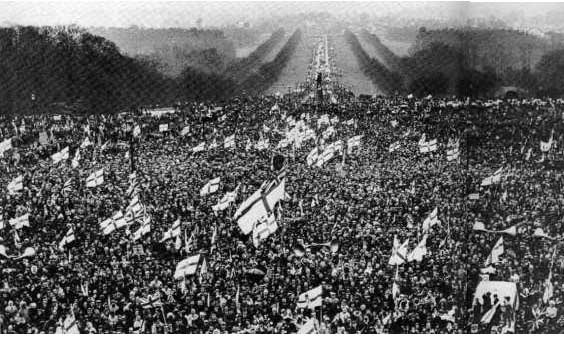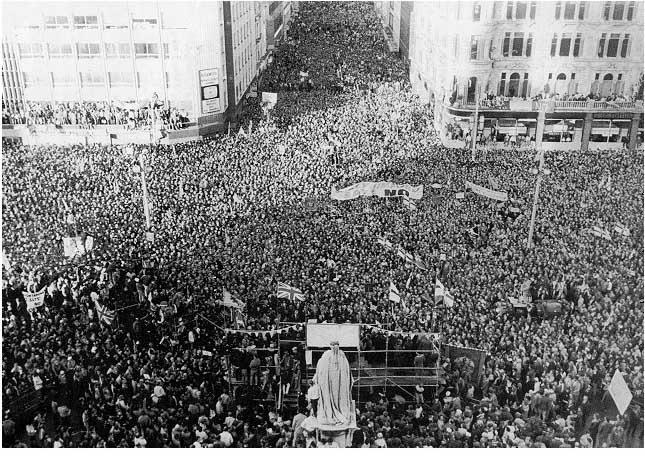TWO SOVEREIGN GOVERNMENTS

Unionist protest against the Council of Ireland, 1974

Unionist protest against the Anglo Irish Agreement, 1985
I have elaborated on this possibility of 'administrative devolution' at some length because I think it helps us to understand the enormity of John Hume's achievement in bringing about the 'Anglo-Irish Agreement' of 1985. It would be difficult to argue that this did anything to improve the conditions of life for Catholics or to bring the war to an end. In driving the Unionists into a state of near madness it had the opposite effect. The level of violence, which had been on the decline prior to the Agreement, rose again. But in effectively giving the Republic's government a veto over legislative proposals for Northern Ireland it put an end to the possibility of establishing constitutional stability on the basis of direct rule.
For John Hume the advance or otherwise of Catholic interests in Northern Ireland was not the primary issue. The primary issue was sovereignty. The partition of 1920 had been a wrong done to the Irish people as a whole. The only eventual solution was Irish unity. But this could not be achieved straightaway. What was required therefore was an interim arrangement that would contain within it an impetus towards Irish unity. That impetus would be provided in the first instance by 'an immediate declaration by Britain that she believes that it would be in the best interest of all sections of the Communities in both Islands, if Ireland were to become united on terms which would be acceptable to all the people of Ireland and that she will positively encourage the prosecution of this view point.'
In the meantime the interim arrangement would have to reflect the two national allegiances existing in Northern Ireland, giving them each an equal value:
'In the absence of a settlement which they will regard as better than their present position Protestant loyalty in general will remain partly to Britain, partly to themselves as a people, to their way of life and to a British link as a safeguard of that way of life. On the other hand Catholics in general will continue to give their loyalty to Ireland. Immediate unity therefore means defeat of Protestants and victory for Catholics, and the continuation of the present constitutional relationship with Britain means victory for Protestants and defeat for Catholics. Either would mean the continued existence of political violence by dissident minorities.'
These quotations are from Towards a new Ireland, the proposals submitted by the SDLP in 1972 to the negotiations that eventually produced the Sunningdale Agreement of 1974. (4) The practical proposals were for a legislative assembly in which the position of minority parties would be enhanced through proportional representation, both in the elections to the Assembly and in the election by the assembly of an executive committee. Any legislation passed in the Assembly would require the signature of two 'commissioners', one appointed by the British sovereign government, the other by the Irish sovereign government. The sovereign governments between themselves would have responsibility for security. Flags of both sovereign states would have equal status. The people of Northern Ireland would not send representatives either to Westminster or to the Dail.
(4) The submissions of all the parties are given in Northern Ireland Office: The future of Northern Ireland - a paper for discussion, HMSO 1972. SDLP proposals, pp.72-82. Also accessible online at the CAIN website - https://cain.ulster.ac.uk/events/crights/sdlp1972.htm
This was broadly the framework that determined Hume's whole political career, at least prior to his involvement in the 'peace process' which, I shall argue, had quite different roots. The power-sharing devolved government established through the Sunningdale agreement fell, as we know, through a massive strike by the Protestant working class which, among much else, had control of the country's electricity supply. But this strike was not, at least at first, directed against the principle of power sharing. It was a protest against the 'Council of Ireland' which was to be set up as part of the Sunningdale arrangements. The success of the agreement depended massively on the personal popularity of Brian Faulkner, leader of the Unionist Party at the time of the negotiations. But Faulkner had lost the leadership of the Unionist Party. His position as head of the executive was extremely fragile. The Council of Ireland gave the Republic's government a consultative role in the government of Northern Ireland. Faulkner had agreed to this on the understanding that the Republic's government had renounced its claim to rightful sovereignty over Northern Ireland. But that claim was built into the Republic's constitution. When the renunciation of sovereignty was challenged in the courts the government said in its defence that its recognition of Northern Ireland was a mere acknowledgement of existing political realities and in no way binding on future Irish governments. In those circumstances the strikers demanded that the Council of Ireland be abandoned. Faulkner and many others appealed to the SDLP to renounce the Council of Ireland at least temporarily but they refused. For them the involvement of the Republic in the government of Northern Ireland was an essential principle. Indeed in the few months of the executive's existence they had made it clear that they regarded Dublin, not Westminster as their own sovereign government. As a result of this - and of the insistence of both the SDLP and the Westminster government on treating the strikers as if they were engaged in a Fascist putsch - support for the strike grew massively and the whole promising power sharing experiment came to an end.
It was of course very fragile and might have come to an end anyway but that cannot be known for certain. What is certain is that, in that moment of truth, the SDLP regarded the principle of Irish government involvement in the governance of Northern Ireland as more important than the maintenance of power sharing.